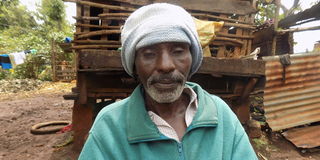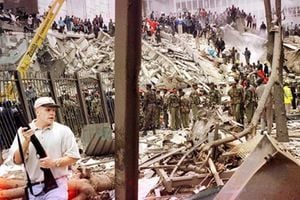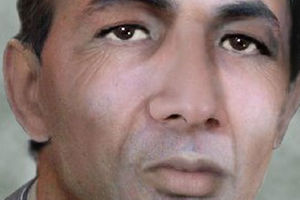
Paul Njuki, 57 became blind after the 1998 bomb attack in Nairobi CBD.
When Paul Njuki landed in Nairobi from Embu in 1983 with big dreams, he had no idea what would happen to him 15 years later.
His dream of becoming a prominent businessman and raising a wonderful family was shattered by the 1998 Nairobi bombings.
Njuki, 57, recalls how, as a young man with great ambitions, he left his home in Kithegi village in Embu and set up a small hardware shop in the Mwiki area.
But on August 7, the day seemed bright to him and, having run out of stock, he boarded a matatu to the city to buy items to sell as usual.
On arriving in the city, he got out and as he was crossing the road near the Cooperative Building, he heard a loud noise and within seconds he was thrown into the air before coming down.
He escaped unhurt and dusted himself off. So shocked that he could not move, he suddenly sat down and watched the unfolding drama as equally panicked people ran for their lives.
At one point, he saw a school minibus tossed into the air and crashing down, killing everyone on board.
Meanwhile, a debris-laden wind and noxious fumes blew over him, and he began to grope around in the dark, unable to see anything.
Moments later, he came to his senses and saw bleeding victims from buildings being carried to safety by police and other rescuers, and realised that a bomb blast had hit the city.
He quickly fled the area and returned to Mwiki to tell his colleagues the shocking story of the terrorist attack.
Mr Njuki told his colleagues that he was lucky to have escaped unhurt, but he was wrong.
Three days after the deadliest blast in Kenya's history, which left more than 200 people dead and 5,000 injured, Mr Njuki was left partially blind and knew something was wrong.
Unable to run his business, he returned to his rural home and was taken to hospital for treatment.
Despite the treatment, he went completely blind and was advised by his family to see an eye specialist at the Embu Referral Hospital, which he did.
During the examination, the doctor asked him if he had ever worked in a gas factory and he replied that he had never done so.
"I told him that I was in the city when terrorists attacked and some gases, which I thought came from the massive explosions, got into my eyes. Suddenly the doctor told me that the fumes had affected my eyes and that was why they were bleeding yellow," he recalled.

Paul Njuki, 57 and his wife Elizabeth Njoki. Mr Njuki from Embu became blind after the 1998 bomb attack in Nairobi.
He underwent surgery but was still unable to see.
With his eyes constantly watering, Njuki lamented that he was one of the unknown and forgotten victims of the terrorist attack, suffering immeasurably at home.
"I learnt that I was a victim of the bombings when I went blind after gases from the explosives got into my eyes, but the government hasn't recognised me because I never reported anywhere out of ignorance," he explained as he thoughtfully fumbled for his walking stick.
Life for the father of eight has now taken a turn for the worse as he can't afford to pay school fees for his children, four of whom are in secondary school.
Once an entrepreneur, Njuki has become a beggar.
On market days, he is accompanied by his wife, Elizabeth Njoki, to the nearby Kithimu market to beg.
"I now depend on well-wishers because I'm disabled. The terrorists have ruined my life and I can't meet all my financial obligations. I appeal to the government to help me educate my beloved children. I also ask for compensation for the damage caused," he pleaded.







